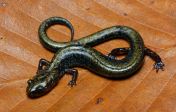Eastern Kentucky University faculty recently received a National Science Foundation Research Experiences for Undergraduates (REU) grant in support of undergraduate student internships to study the ecological effects of anthropogenic and natural disturbances in central Appalachia.
Students will be paired with faculty mentors and work full time through the summer as part of research teams alongside faculty, graduate students and agency professionals. The immersion in Appalachia will add a social and historical context to the research.
Ten students will be accepted each year of the three-year program. Recruitment will be nationwide, with an emphasis on encouraging students from central Appalachia to apply. EKU students may apply. The program will also include teachers as part of a parallel Research Experiences for Teachers project.
 The overall objective of the project is to engage students in efforts to develop science-informed solutions to the ecological consequences of human-caused disturbance in the region. Students will study anthropogenic disturbance in an effort to contribute knowledge to answer the theme of the REU: What do sustainable and resilient ecosystems look like after a long period of dramatic disturbance and deconstruction, and what are the best approaches to restoration for ensuring a highly functioning alternative state?
The overall objective of the project is to engage students in efforts to develop science-informed solutions to the ecological consequences of human-caused disturbance in the region. Students will study anthropogenic disturbance in an effort to contribute knowledge to answer the theme of the REU: What do sustainable and resilient ecosystems look like after a long period of dramatic disturbance and deconstruction, and what are the best approaches to restoration for ensuring a highly functioning alternative state?
Students will participate in all aspects of research, including study design, data collection, analyses, and presentation of results. The setting will allow students to engage with their community by communicating with scientists and the public, while exploring the implications of their own research in a setting rife with controversy related to the economic and cultural tradeoffs of resource extraction and environmental conservation.
Weekly workshops will guide students through the process of connecting their research experiences with tacit skills such as ethics, leadership, and career development. Such skills are essential to many careers, including research and natural resource management, according to Dr. David Brown, associate professor of biological sciences and one of the project directors. Participants “will develop research skills and career growth strategies, while interacting with a dynamic group of colleagues and mentors.”
“The research objectives,” Brown said, “are to explain the ecosystem impacts of coal mining and other disturbances in central Appalachia, the mechanisms and trajectory of community successional processes occurring in the wake of those disturbances, and restoration approaches that recognize alternative ecosystem states and feedback.”
Students and mentors will work in aquatic and terrestrial habitats at watershed and regional scales. Such an integrative approach, spanning aquatic and terrestrial systems across descriptive, mechanistic, and restoration processes, is unique within the framework of anthropogenic disturbance regimes of the eastern United States. The training of a diverse group of students will also contribute to a new generation of scientists. For the 2017 summer season, research projects will address specific questions pertaining to skunk ecology, pollinator restoration, old-growth forest ecology, stream and wetland ecology, bird communities of hemlock forests, and human dimensions of cave bat management strategies.
Dr. Stephen Richter, professor of biological sciences and associate director of natural areas and the other co-principal investigator, said the program’s mentors “are doing cutting-edge ecological science but as EKU faculty, their number one mission is training undergraduates to be good scientists.”
Richter, an amphibian biologist, said: “Everyone loves amphibians, but few get a chance to do applied research that will help conserve these declining animals. This is a great opportunity for students to gain that type of experience, but the study questions are broad enough to accommodate diverse interests in ecology.”
Mentors will include faculty from multiple EKU departments including Biological Sciences, Geosciences, Recreation and Park Administration, and Environmental Health Science.
The 10-week program will run May 22-July 28 in 2017. Benefits for students include housing on EKU’s campus and research space in the University’s New Science Building. Much of the research for the internships will be based out of Lilley Cornett Woods, an old-growth forest site in southeastern Kentucky and one of EKU’s natural areas. New laboratory infrastructure at Lilley Cornett is provided in the Research and Learning Center, which was constructed with separate NSF funding. Student interns will also spend time at another of EKU’s natural areas, Maywoods Environmental and Educational Laboratory, which straddles parts of Garrard and Rockcastle counties.
For more information about the program, visit bioreu.eku.eduor email bioreu@eku.edu.
Inset photo: The Southern Ravine Salamander, Plethodon richmondi, is one of the many species of woodland salamander of Appalachia that student researchers will study. They lack lungs, as do the rest of the family members of Plethodontidae, and they have direct development, meaning there is no larval stage. (Photo by J. Alex Baecher)
